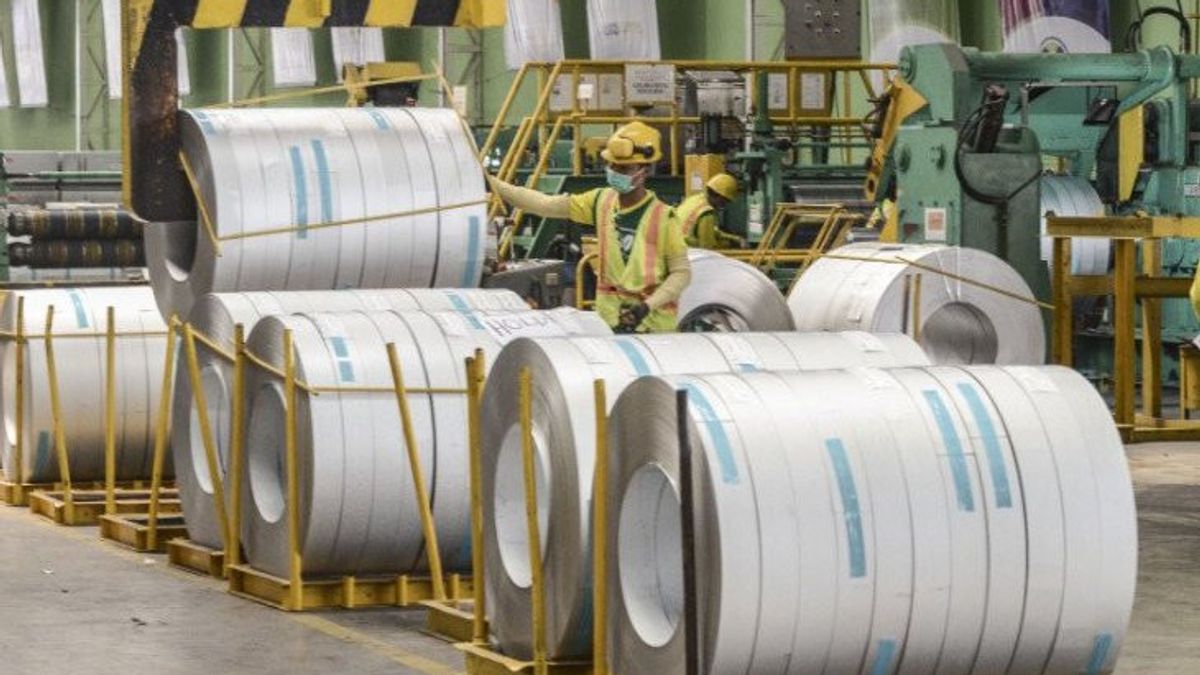JAKARTA - The feud between two light steel companies, holders of the rights to the KASO and KasoMax brands, is still rolling.
Both are registered in grade 6 for light steel products at the Directorate General of Intellectual Property (DJKI) of the Ministry of Law and Human Rights.
Tensions escalated as the owner of the KasoMax brand claimed to have criminalized despite legally having the right to its trademark.
This disappointment was conveyed while attending a discussion by politician Akbar Faisal, entitled 'The Age of the Light Steel Industry! Big Company Turns Off MSMEs Kaso X KasoMax.' on social media.
The discussion was attended by Teddy Anggoro and Nugraha Bratakusumah (Egi).
In the discussion, it was revealed that the owner of the KASO brand, PT Tatalogam Lestari, had registered his trademark since January 14, 2010 and operated on the lightweight steel market in Indonesia.
Meanwhile, KasoMax brand owner Tedi Hartono only registered his trademark on October 7, 2021.
Although both brands are legally recognized, the owner of the KASO brand sued KasoMax to the Central Jakarta Commercial Court, claiming there are similarities that can confuse consumers.
The court also canceled the KasoMax brand registration.
After the decision, the owner of the KasoMax brand filed an appeal to the Supreme Court, but this application was rejected.
PT Tatalogam Lestari then reported the owner of KasoMax to the Bengkulu Police because he was still selling his products on the market.
Although some cases were terminated and others canceled, the owner of KasoMax was named a suspect.
Egi assessed that this case showed an error in law enforcement.
'Merek 'KASO' is a common name for the type of goods in the construction industry, especially mild steel. According to the Brand Law, the use of general names for brand registration should not be allowed," he explained.
Teddy Anggoro added the importance of differential power in brand registration.
"Merek is an identity that must have a differentiating power in certain products or services. The registration process should go through a substantive examination to prevent the registration of descriptive or general brands," he said.
Both agreed that the Ministry of Law and Human Rights, especially the Directorate General of Intellectual Property, should be more active in resolving this dispute.
If both sides have valid trademark rights, a peaceful settlement should be prioritized over criminal acts.
This case then attracted the attention of legal experts from various universities to conduct research.
One of the results was published by Professor of Law at the University of North Sumatra, OK Saidin.
In his writing, he highlighted the mistakes that might occur at the Ministry of Law and Human Rights, especially DJKI, which received the KASO brand registration 14 years ago and KasoMAX 3 years ago.
He noted that previously, the DJKI brand inspector rejected the KasoMAX registration application.
However, the Brand Appeal Commission, which was then led by Teddy Anggoro, actually granted it.
OK Saidin emphasized that brand registration must be based on differential powers that do not mislead consumers.
"Different systems must be based on good faith (Article 21 paragraph 3 of themark Law and Geographical Indications)," he said.
He also explained that brands that do not have differential power should not be registered, because the function of the brand is to distinguish products in trade.
For example, the Kopi brand cannot be registered, but Kopi Kapal Api is allowed.
Referring to Law no. 20 of 2016, brands cannot be registered if they are the same or related to the requested goods.
In this case, the word 'Kaso' is not registered with KBBI, so it is not a general word.
Therefore, Kaso is not a generic word, and with the addition of the 'MAX', the KasoMAX brand has a different impression.
However, he questioned why he did not choose a more original name.
Brand registration must meet the requirements, including good faith.
DJKI rejects KasoMAX based on existing regulations, considering that the KASO brand is registered first.
There are allegations that KasoMAX was registered in bad faith.
After the Commercial Court's decision, the owner of KasoMAX registered three new brands, but PT Tatalogam Lestari objected, and the registration was rejected by DJKI.
SEE ALSO:
The Commercial Court has decided that the owner of KASO is the party entitled to the brand.
The Supreme Court also rejected the appeal from the owner of KasoMAX, and DJKI issued a decision to cancel the KasoMAX brand.
After the decision, KasoMAX products were still circulating on the market, so the owner of KASO filed a criminal charge.
OK Saidin explained that this legal action was in accordance with the provisions of the Trademark Law and the Criminal Procedure Law.
The English, Chinese, Japanese, Arabic, and French versions are automatically generated by the AI. So there may still be inaccuracies in translating, please always see Indonesian as our main language. (system supported by DigitalSiber.id)















